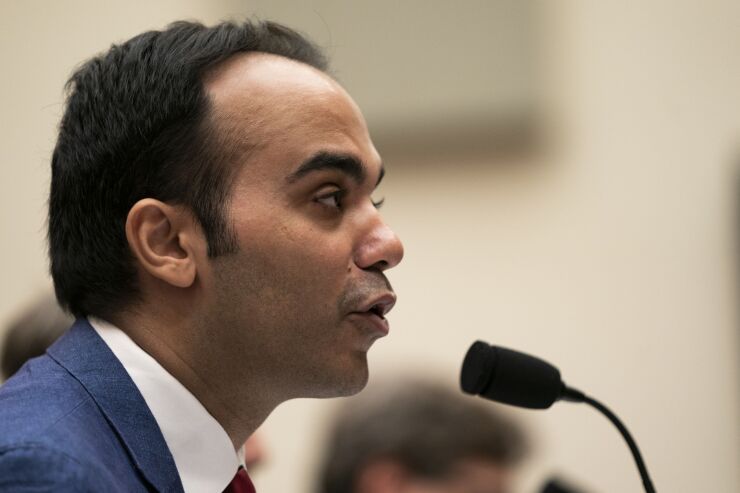The Consumer Financial Protection Bureau proposed a rule on Monday that would require nonbanks to report any state and local court orders or judgments involving consumer financial products to the bureau, which it would pool into a database of violators that would be available to the public.
The CFPB said it plans to create a registry of so-called "lawbreakers" that would potentially mitigate risks to consumers and help "unify the efforts of consumer financial protection enforcers." In a

The proposed rule — which will be open to public comment 60 days after its publication in the Federal Register — also would require large nonbanks subject to the CFPB's supervision to assign a senior executive to attest to the federal government in writing that a company is in compliance with all orders.
"Protecting American households is a shared effort across local, state and federal authorities," CFPB Director Rohit Chopra said in a press release. "The proposed registry will help the CFPB, the law enforcement community and the public limit the harms from repeat offenders."
The registry would be a whole new mechanism for the CFPB to police nonbanks such as mortgage servicers, auto and title companies, and payday and installment lenders. The bureau said it may apply the registry to federally insured banks and credit unions in the future.
"While the CFPB might later consider collecting or publishing the information described in the proposal from insured banks and credit unions, there is currently greater need to collect this information from nonbanks under its jurisdiction," the bureau said in its press release.
But it remains unclear how a CFPB registry would differ from the Nationwide Multistate Licensing System created and overseen by the Conference of State Bank Supervisors. The NMLS serves as the system of record for nonbank financial institutions. In addition, the Federal Trade Commission operates the
The CFPB consulted with state regulators about issuing the proposed rule as required by the Dodd-Frank Act, sources said. Chopra has repeatedly admonished repeat corporate offenders and earlier this year said the CFPB
The CFPB already has examination authority over certain nonbanks, has regular contact with state bank regulators and operates a consumer complaint database that provides tips on which banks and financial institutions may be running afoul of consumer protection laws. The bureau said a registry is needed to keep track of all that is going on at the state and local levels.
"Because the issuance of agency and court orders serves as one of the most important tools to pursue lawbreakers in these markets, it is important that the CFPB maintain a central repository of nonbanks subject to agency and court orders," the bureau said in the release. "The repository will allow the CFPB to track and mitigate the risks posed by repeat offenders, while also being able to monitor all lawbreakers subject to agency and court orders."
Under the proposed rule, nonbanks would have to report all court orders and judgments including consent and stipulated orders brought under federal consumer protection laws or state laws governing unfair, deceptive or abusive acts or practices, known as UDAAP. The CFPB said that large nonbanks that are supervised would have to designate a senior executive to attest to a firm's compliance with orders. The executives would have to submit an annual supervisory written statement attesting to the steps taken to oversee the activities subject to any order and whether the executive knows of any violations or noncompliance.
The proposal was issued under a little-used section of consumer law known as section 1022 of the Consumer Financial Protection Act.






